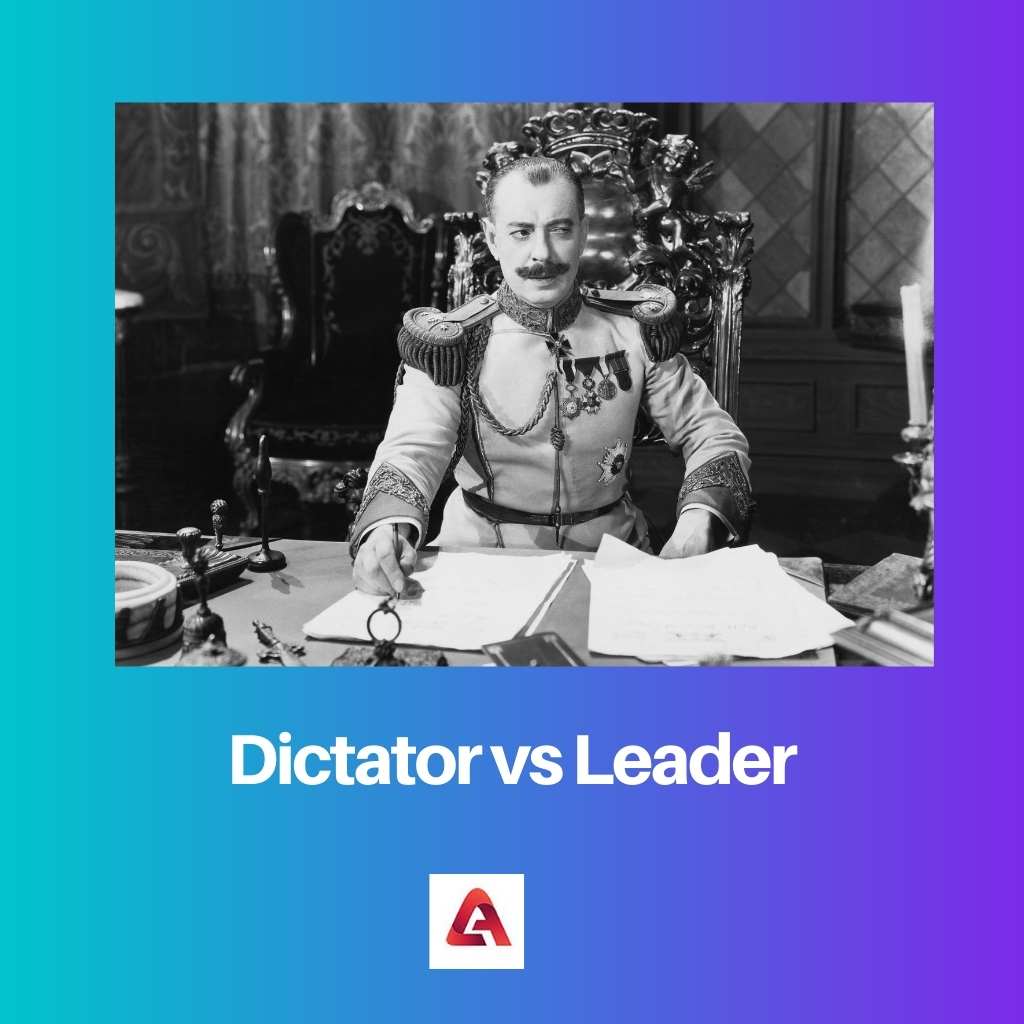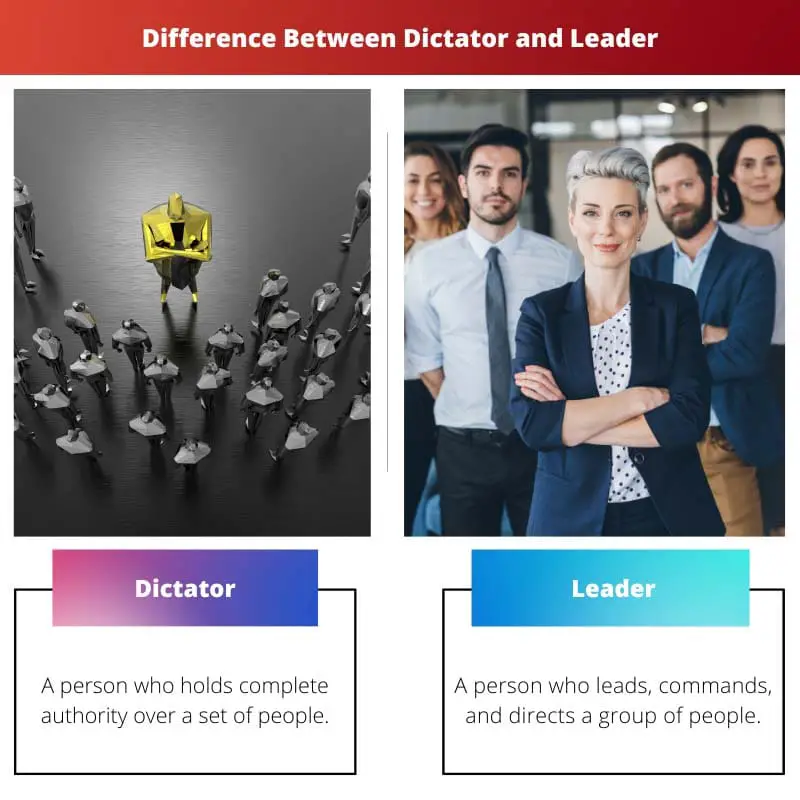Sometimes, it is difficult to forget the difference between a dictator and a leader, especially when the latter abuses their authoritative power over those under them.
The terms dictator and leader are the names given to those who uphold systems that follow dictatorship and leadership, respectively.
Organizations, politics, societal institutions, and even families use either form of management in their workings.
Key Takeaways
- A dictator exercises absolute control and makes decisions unilaterally, while a leader collaborates with others and considers their input in decision-making processes.
- Dictators suppress opposition and dissent, while leaders encourage open dialogue and differing opinions.
- Dictators hold power through force or manipulation, whereas leaders gain respect and authority through their skills, knowledge, and integrity.
Dictator vs Leader
A dictator is a ruler who holds absolute power and authority, through force and coercion. A leader is an individual who inspires and guides others to achieve a common goal or vision. A dictator’s position is undemocratic meanwhile, a leader is an individual who inspires and guides others.

As the name suggests, the dictator is someone who dictates control over a country, organization, team, or even a family-concerned situation.
In this concept, the dictator follows the autocratic method of management. This is a much-criticized concept as it allows no room for changes or suggestions and demands total obedience from the subordinates.
A leader is an individual who leads or commands a group, organization, or country.
They are held in high esteem and are tasked with solving conflicts, offering resolutions, and guiding people to achieve objectives that ultimately satisfy all parties involved.
Leadership can make or break any institution and can be considered the roots of any institution.
Comparison Table
| Parameters of Comparison | Dictator | Leader |
|---|---|---|
| Definition | A person who holds complete authority over a set of people. | A person who leads, commands, and directs a group of people. |
| Characteristics | Dictators are persuasive, manipulative, and controlling. | Leaders are helpful, humble, and patient. |
| Respect | Dictators demand respect in the form of obedience. | Leaders command respect when they are effective. Respect is earned. |
| Aim | They achieve the end goal by any means necessary. | They believe in collective growth. |
| Reinforcement | The dictator uses reinforcement methods that include punishments and threats. | Leaders offer rewards and suggestions as a form of reinforcement. This is highly effective. |
What is a Dictator?
A dictator is a word used to refer to an individual who is considered to be the absolute ruler of a group, team, institution, organization, or even a country.
A dictator uses complete force and instills fear in his subjects to retain his power and authority. A dictator may also include allies who have an equally bigoted approach.
This person essentially makes all the rules and regulations; the laws dictated and governed directly interest his interests. Certain countries follow this form of government.
Countries under a dictator have a dictatorship regime. This form of governmental system is heavily opposed due to the constraints and reservations that the citizens are subjugated to.
Several historical examples of dictatorship are violent, manipulative, and lending the whole country an aura of uncertainty and fear.
This word was born from the Roman Republic. This ancient form of rule believed in handing over complete power to a single man in the face of crisis for a short period of time to single-handedly decide on the decisions to be taken.
Harsh leaders who demand respect and command their subordinates to obey their orders are referred to as dictators. Dictators are also born during revolutions.
The political link is at its weakest during a revolution, allowing a dictatorship style of governance.
What is a Leader?
All aspects of life have a leader present in them. This leader could be plainly visible or absent. A leader is someone who essentially inspires motivation and passion in their followers.
Leaders can be found in a workplace, home environment, political, and governmental organizations. A leader holds the responsibility of guiding, influencing, exercising control over their teammates.
Leadership is the process of influencing the behavior of people by making them strive voluntarily towards the achievement of organizational goals.
It basically indicates the ability of a manager to maintain good interpersonal relations with their subordinates and motivate them to contribute to the achievement of organizational objectives.
This holds true for both personal and official leaders.
A leader should own the ability to influence others. They should be capable of bringing about a change in the behavior of others.
They exercise the people in their groups to achieve common goals of the institution that they are a common part of.
The leader has a continuous responsibility to maintain the relationship between the leaders and the followers.
They have a set vision and a goal path that would lead to their ultimate achievement. A leader ensures that those who look up to him are given their complete support and all tools necessary for its attainment.

Main Differences Between Dictator and Leader
- A dictator lords absolute control over a person, set of people, or a region. This power is mostly gained via force. A leader uses the process of influencing people to strive willingly for desired common goals.
- While dictators are widely feared, leaders are respected on the other hand.
- The key characteristics of a dictator are persuasiveness, manipulation, and exhibiting controlling tendencies. The elements that make a good leader are humbleness, helpfulness, and humility.
- While dictators focus on gaining power and abusing those under them, leaders focus on the growth of the individual and related system as a whole.
- One of the key differences between a dictator and a leader is that a dictator wishes to be served, whereas a leader wishes to serve.

- https://link.springer.com/article/10.1007/s11127-009-9491-2
- https://scholar.archive.org/work/myb5ulnrlfcotkd63ob2w7ftru/access/wayback/https://www.cambridge.org/core/services/aop-cambridge-core/content/view/3070679A8CC4979D43539D27815584F2/S1368980009990395a.pdf/div-class-title-time-for-leadership-development-interventions-in-the-public-health-nutrition-workforce-div.pdf
